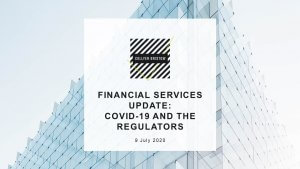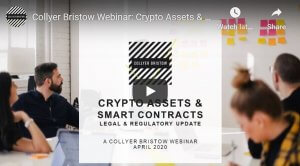- Financial regulatory
- Financial services

Longer Reads
Regulating Remotely – thoughts from our recent webinar
In our recent Financial Services webinar, the speakers looked at the legal and practical implications that organisations and employees need to be aware of and the adjustments to be made to policies to ensure compliance in a longer-term remote working environment.
6 minute read
Published 7 December 2020
Key information
Working from the home office is now the norm for most in the financial services industry. In our recent Financial Services webinar, the speakers looked at the legal and practical implications that organisations and employees need to be aware of and the adjustments to be made to policies to ensure compliance in a longer-term remote working environment.
A brief summary of the points raised in the webinar is outlined below, and, for more detail, the webinar recording is available here.
Employees: What they need to know
What does the government guidance to ‘work from home if you can do so effectively’ mean?
We suggest that this is a high threshold – if your employees have been working from home with few issues then it could be an unnecessary risk to ask them to return to the workplace. If some employees do wish to return, a two-way discussion with them may facilitate this.
The duty of the employer to provide a safe and healthy work environment extends to home offices
Employers should be taking steps to protect the mental and physical wellbeing of employees, such as offering supervisor ‘check ins’ regarding mental health and conducting (and reviewing) desk assessments.
Employee monitoring and surveillance
Above all, employers should inform their employees that they are going to be monitored and try to get consent, although there are some exceptions, and the monitoring should go no further than necessary. Cherry picking who to monitor could give rise to a discrimination claim and therefore it is best, for an employer who wishes to monitor its employees, to simply monitor all employees.
Regulatory Issues
Senior Managers and Certification Regime
The Financial Conduct Authority (FCA) and Prudential Regulatory Authority (PRA) recognise the need to redeploy staff in order to cover for furloughed managers and there is guidance in relation to this:
- A furloughed SMF’s responsibilities should preferably be allocated to an approved SMF;
- Furlough renders a manager dormant and no reapproval is required upon their return;
- SMFs are allowed to perform without approval for 36 weeks, rather than 12, for solo FCA regulated firms;
- Statements of Responsibility and Responsibilities Maps must be updated internally (there is no need to submit them to the FCA); and
- Key SMFs such as Compliance Officers and Money Laundering Reporting Officers (SMF16 and SMF17) should only be furloughed as a very last resort.
Additionally, the implementation of the Senior Managers & Certification Regime Conduct Rules for solo-regulated firms has been delayed until 31 March 2021.
Business Continuity Plans (‘BCPs’)
All FCA-authorised firms must have appropriate and proportionate BCPs, and firms should take all reasonable steps to meet their regulatory obligations. Where BCPs are activated, firms should consider whether to continue activating them and notify the FCA if they are deactivated (if required). BCPs should be reviewed to ensure they are fit for the current climate and stand up to potential regulatory scrutiny.
Data Protection
Risks – Infrastructure & hardware and working practices
Working remotely renders businesses far more vulnerable to cyber-attacks without the office-based security protections. There are a host of increased risks, such as the use of personal devices, sharing hardware with other household members, and printing, storing and disposing of physical data. There is also an increased reliance on written communication via email and chat functions, which can be an issue for Data Subject Access Requests and there is an increased risk of calls being overheard by others.
Tips to enhance security for remote working
(1) Review all data handling practices. Is your approach to communicating important information secure? Do you use VPNs or secure applications for file sharing? Where are printed documents stored and how are they disposed of?
(2) Carry out a data privacy impact assessment of the implications of employees working from home long term.
(3) Revise data security and homeworking policies to mitigate risks and provide comprehensive training on these policies – they are useless in a vacuum. Are employees trained to be alert to conversations that should be dealt with sensitively and those that should not be committed to writing?
(4) Update data breach policies and procedures
(5) Review/purchase a cyber-security liability insurance policy
Premises / Real estate
General trends
With so many people working from home, companies are reconsidering the space they need with some closing offices and some permanently working from home. A number of trends have therefore emerged:
- An increase in postponed deals, with corporates delaying investment.
- Tenants are increasingly looking to exit leases and renegotiate terms, including rent reductions, rent-free periods, paying monthly instead of quarterly and adding tenant break rights.
- Landlords are increasingly requesting extensions to lease terms in return.
- Tenants are also asking for clauses giving them a right to rent suspension, or to end the lease, if government action in relation to Covid-19 or other disease renders them unable to access the property. Although there is push back from landlords on this, it is something to consider if negotiating a new lease.
Practical implications of Covid-19
Until 31 December 2020 (subject to further extension), there are certain restrictions on landlords, such as preventing them from exercising the right to re-entry or forfeiture of the lease, particularly in relation to non-payment of rent. In addition, the government has implemented measures protecting commercial tenants from aggressive rent collection.
Potentially, tenants could be responsible for additional costs, such as ensuring 24-hour security when the property is vacant, so it is worth checking the terms of the lease. It is also worth noting that, if landlords are incurring extra costs relating to, for example, more rigorous cleaning, then they could potentially pass those costs on to the tenant within the service charge.
Going back to the office involves making the premises Covid-secure, such as removing shared items like remote controls, and we have written further guidance about managing the transition safely here.
Commercial contracts
All businesses need to take a careful look at their commercial contracts to see if they are still fit for purpose. These contracts typically fall into two main categories:
(1) Agreements with suppliers, particularly long-term agreements
These might no longer fit the business needs and be considered a waste of resources, for example a contract for provision of IT equipment in the office. There may be termination provisions within the contract, or the potential to end the contract by giving reasonable notice. Alternatively, it may be possible to make amendments by negotiation and agreement. However, you do not know your options unless you check the terms.
If a supplier is not ready, willing and able to provide services, the right to terminate the contract might arise, or they may have a legal excuse under the contract if there is a force majeure (or ‘Act of God’) clause. Force majeure clauses cater for specified extreme events and allow for obligations under a contract to be treated differently in those circumstances. If a given force majeure clause covers an event like Covid-19 (or its consequences), this could allow for suspension of performance without fault. Again, you do not know your options unless you check the terms.
Despite the press coverage, Covid-19 and issues arising from lockdown are fairly unlikely to frustrate – i.e. permanently discharge without fault – most long-term contracts. This is because government restrictions are temporary and, in many cases, do not make performance of contracts impossible or radically different from what was originally intended. Instead, in most cases they will make performance of contracts more difficult, costly or perhaps unnecessary for the client (which are unlikely, in themselves, to be issues that give rise to frustration).
In the changing business landscape, when considering new contracts, consider whether they can be structured as a series of short-term contracts, or have relatively flexible termination provisions.
(2) Agreements with clients, including standard terms and conditions
Most financial services businesses are likely to have highly developed and up to date agreements with their clients. However, a contract review is always a good idea every so often – especially when most existing contracts were drafted when the world was different (and, in some ways, it will now be different forever). For example, how much do contract terms depend on having a physical office? And do they really need to? Revisiting certain “boilerplate” terms – for example, adding or updating force majeure clauses – could help stave off major issues and potentially claims in the future.
Force Majeure
It is important to emphasise that force majeure is not a stand-alone concept in English law. It is just a type of clause that one might have in a contract, if that was expressly agreed by the parties to the contract. Therefore, if a contract does not have a force majeure clause, force majeure cannot be used. Similarly, if a force majeure clause does not cover circumstances linked to Covid-19 and lockdown, it cannot be used in those circumstances (although there should be careful consideration of the precise drafting concerning events that are envisaged by the terms).
“Guidance on responsible contractual behaviour in the performance and enforcement of contracts impacted by the COVID-19 emergency”
This was strong encouragement from the Government for contracting parties to act responsibly and fairly. However, it is just guidance and has no force of law and it does not apply (to the extent it really affects anything) to financial market transactions.
Recent changes to insolvency law
These have had an impact on certain termination rights in contracts for the supply of goods or services. Those changes have rendered clauses that allow for termination, in the event of insolvency of the counterparty, unenforceable. There are various exemptions and financial services businesses (whether they be the supplier or the client) are largely exempt from that change to the law.
Q&A
Can an employee work remotely from abroad for two weeks, and what happens if an employee wants to work abroad for longer?
Many employers are already starting to put policies in place to deal with this. The basic answer is that there needs to be discussion between employer and employee to see what can be agreed. If you weren’t going into the office for whatever reason, you would inform your employer and the same should apply here. Potentially there could be a compromise, with some of the time taken as annual leave.
If an employee is looking to work abroad for a longer time, it should be considered that the employment contract will very likely include a ‘place of work’ clause, and a longer working abroad arrangement could constitute a contract variation which needs to be agreed by both parties. There may also be some tax and regulatory implications to consider.
We are a few months into emergency working, with regard to BCPs, do you think the regulators will expect businesses to look more carefully at those over the next few months?
Yes – there is a strong expectation that the FCA is going to delve into how BCPs performed under pressure and to see how the processes work. The activation of BCPs is usually very rare, but now many businesses have activated theirs.
In a building with shared occupation with multiple businesses, does everyone need to be temperature screened, for example, and who is responsible for that?
The landlord might enforce particular measures for the whole building or common areas where they are responsible, however it is very much up to the individual businesses in their own demise. Businesses will also have a duty to their employees and an approach should be taken in consultation with employees.
If you have a contract you are desperate for someone to perform because you can’t get whatever it is from anyone else, what are your rights there?
Absent the other side being able to look to a specific clause in the agreement, like a force majeure clause, normal contractual rights would apply, and you could look at remedies like specific performance or an injunction.
If the supplier is having difficulty getting things from elsewhere, or it is more expensive to do so, largely that is their problem.
If they are pointing to a specific clause to seek to excuse their failure to perform, you would interrogate that clause very closely to work out if it is really applicable in the current circumstances. If they are saying it is impossible to perform, then you get into frustration, but that is a high bar.
In order to get an order for specific performance or an injunction, one would also need to be able to show that damages would not be an inadequate remedy for the breach of contract, in the circumstances.
For more detail, the webinar recording is available here.
Related content
Longer Reads
Regulating Remotely – thoughts from our recent webinar
In our recent Financial Services webinar, the speakers looked at the legal and practical implications that organisations and employees need to be aware of and the adjustments to be made to policies to ensure compliance in a longer-term remote working environment.
Published 7 December 2020
Associated sectors / services
Authors
Working from the home office is now the norm for most in the financial services industry. In our recent Financial Services webinar, the speakers looked at the legal and practical implications that organisations and employees need to be aware of and the adjustments to be made to policies to ensure compliance in a longer-term remote working environment.
A brief summary of the points raised in the webinar is outlined below, and, for more detail, the webinar recording is available here.
Employees: What they need to know
What does the government guidance to ‘work from home if you can do so effectively’ mean?
We suggest that this is a high threshold – if your employees have been working from home with few issues then it could be an unnecessary risk to ask them to return to the workplace. If some employees do wish to return, a two-way discussion with them may facilitate this.
The duty of the employer to provide a safe and healthy work environment extends to home offices
Employers should be taking steps to protect the mental and physical wellbeing of employees, such as offering supervisor ‘check ins’ regarding mental health and conducting (and reviewing) desk assessments.
Employee monitoring and surveillance
Above all, employers should inform their employees that they are going to be monitored and try to get consent, although there are some exceptions, and the monitoring should go no further than necessary. Cherry picking who to monitor could give rise to a discrimination claim and therefore it is best, for an employer who wishes to monitor its employees, to simply monitor all employees.
Regulatory Issues
Senior Managers and Certification Regime
The Financial Conduct Authority (FCA) and Prudential Regulatory Authority (PRA) recognise the need to redeploy staff in order to cover for furloughed managers and there is guidance in relation to this:
- A furloughed SMF’s responsibilities should preferably be allocated to an approved SMF;
- Furlough renders a manager dormant and no reapproval is required upon their return;
- SMFs are allowed to perform without approval for 36 weeks, rather than 12, for solo FCA regulated firms;
- Statements of Responsibility and Responsibilities Maps must be updated internally (there is no need to submit them to the FCA); and
- Key SMFs such as Compliance Officers and Money Laundering Reporting Officers (SMF16 and SMF17) should only be furloughed as a very last resort.
Additionally, the implementation of the Senior Managers & Certification Regime Conduct Rules for solo-regulated firms has been delayed until 31 March 2021.
Business Continuity Plans (‘BCPs’)
All FCA-authorised firms must have appropriate and proportionate BCPs, and firms should take all reasonable steps to meet their regulatory obligations. Where BCPs are activated, firms should consider whether to continue activating them and notify the FCA if they are deactivated (if required). BCPs should be reviewed to ensure they are fit for the current climate and stand up to potential regulatory scrutiny.
Data Protection
Risks – Infrastructure & hardware and working practices
Working remotely renders businesses far more vulnerable to cyber-attacks without the office-based security protections. There are a host of increased risks, such as the use of personal devices, sharing hardware with other household members, and printing, storing and disposing of physical data. There is also an increased reliance on written communication via email and chat functions, which can be an issue for Data Subject Access Requests and there is an increased risk of calls being overheard by others.
Tips to enhance security for remote working
(1) Review all data handling practices. Is your approach to communicating important information secure? Do you use VPNs or secure applications for file sharing? Where are printed documents stored and how are they disposed of?
(2) Carry out a data privacy impact assessment of the implications of employees working from home long term.
(3) Revise data security and homeworking policies to mitigate risks and provide comprehensive training on these policies – they are useless in a vacuum. Are employees trained to be alert to conversations that should be dealt with sensitively and those that should not be committed to writing?
(4) Update data breach policies and procedures
(5) Review/purchase a cyber-security liability insurance policy
Premises / Real estate
General trends
With so many people working from home, companies are reconsidering the space they need with some closing offices and some permanently working from home. A number of trends have therefore emerged:
- An increase in postponed deals, with corporates delaying investment.
- Tenants are increasingly looking to exit leases and renegotiate terms, including rent reductions, rent-free periods, paying monthly instead of quarterly and adding tenant break rights.
- Landlords are increasingly requesting extensions to lease terms in return.
- Tenants are also asking for clauses giving them a right to rent suspension, or to end the lease, if government action in relation to Covid-19 or other disease renders them unable to access the property. Although there is push back from landlords on this, it is something to consider if negotiating a new lease.
Practical implications of Covid-19
Until 31 December 2020 (subject to further extension), there are certain restrictions on landlords, such as preventing them from exercising the right to re-entry or forfeiture of the lease, particularly in relation to non-payment of rent. In addition, the government has implemented measures protecting commercial tenants from aggressive rent collection.
Potentially, tenants could be responsible for additional costs, such as ensuring 24-hour security when the property is vacant, so it is worth checking the terms of the lease. It is also worth noting that, if landlords are incurring extra costs relating to, for example, more rigorous cleaning, then they could potentially pass those costs on to the tenant within the service charge.
Going back to the office involves making the premises Covid-secure, such as removing shared items like remote controls, and we have written further guidance about managing the transition safely here.
Commercial contracts
All businesses need to take a careful look at their commercial contracts to see if they are still fit for purpose. These contracts typically fall into two main categories:
(1) Agreements with suppliers, particularly long-term agreements
These might no longer fit the business needs and be considered a waste of resources, for example a contract for provision of IT equipment in the office. There may be termination provisions within the contract, or the potential to end the contract by giving reasonable notice. Alternatively, it may be possible to make amendments by negotiation and agreement. However, you do not know your options unless you check the terms.
If a supplier is not ready, willing and able to provide services, the right to terminate the contract might arise, or they may have a legal excuse under the contract if there is a force majeure (or ‘Act of God’) clause. Force majeure clauses cater for specified extreme events and allow for obligations under a contract to be treated differently in those circumstances. If a given force majeure clause covers an event like Covid-19 (or its consequences), this could allow for suspension of performance without fault. Again, you do not know your options unless you check the terms.
Despite the press coverage, Covid-19 and issues arising from lockdown are fairly unlikely to frustrate – i.e. permanently discharge without fault – most long-term contracts. This is because government restrictions are temporary and, in many cases, do not make performance of contracts impossible or radically different from what was originally intended. Instead, in most cases they will make performance of contracts more difficult, costly or perhaps unnecessary for the client (which are unlikely, in themselves, to be issues that give rise to frustration).
In the changing business landscape, when considering new contracts, consider whether they can be structured as a series of short-term contracts, or have relatively flexible termination provisions.
(2) Agreements with clients, including standard terms and conditions
Most financial services businesses are likely to have highly developed and up to date agreements with their clients. However, a contract review is always a good idea every so often – especially when most existing contracts were drafted when the world was different (and, in some ways, it will now be different forever). For example, how much do contract terms depend on having a physical office? And do they really need to? Revisiting certain “boilerplate” terms – for example, adding or updating force majeure clauses – could help stave off major issues and potentially claims in the future.
Force Majeure
It is important to emphasise that force majeure is not a stand-alone concept in English law. It is just a type of clause that one might have in a contract, if that was expressly agreed by the parties to the contract. Therefore, if a contract does not have a force majeure clause, force majeure cannot be used. Similarly, if a force majeure clause does not cover circumstances linked to Covid-19 and lockdown, it cannot be used in those circumstances (although there should be careful consideration of the precise drafting concerning events that are envisaged by the terms).
“Guidance on responsible contractual behaviour in the performance and enforcement of contracts impacted by the COVID-19 emergency”
This was strong encouragement from the Government for contracting parties to act responsibly and fairly. However, it is just guidance and has no force of law and it does not apply (to the extent it really affects anything) to financial market transactions.
Recent changes to insolvency law
These have had an impact on certain termination rights in contracts for the supply of goods or services. Those changes have rendered clauses that allow for termination, in the event of insolvency of the counterparty, unenforceable. There are various exemptions and financial services businesses (whether they be the supplier or the client) are largely exempt from that change to the law.
Q&A
Can an employee work remotely from abroad for two weeks, and what happens if an employee wants to work abroad for longer?
Many employers are already starting to put policies in place to deal with this. The basic answer is that there needs to be discussion between employer and employee to see what can be agreed. If you weren’t going into the office for whatever reason, you would inform your employer and the same should apply here. Potentially there could be a compromise, with some of the time taken as annual leave.
If an employee is looking to work abroad for a longer time, it should be considered that the employment contract will very likely include a ‘place of work’ clause, and a longer working abroad arrangement could constitute a contract variation which needs to be agreed by both parties. There may also be some tax and regulatory implications to consider.
We are a few months into emergency working, with regard to BCPs, do you think the regulators will expect businesses to look more carefully at those over the next few months?
Yes – there is a strong expectation that the FCA is going to delve into how BCPs performed under pressure and to see how the processes work. The activation of BCPs is usually very rare, but now many businesses have activated theirs.
In a building with shared occupation with multiple businesses, does everyone need to be temperature screened, for example, and who is responsible for that?
The landlord might enforce particular measures for the whole building or common areas where they are responsible, however it is very much up to the individual businesses in their own demise. Businesses will also have a duty to their employees and an approach should be taken in consultation with employees.
If you have a contract you are desperate for someone to perform because you can’t get whatever it is from anyone else, what are your rights there?
Absent the other side being able to look to a specific clause in the agreement, like a force majeure clause, normal contractual rights would apply, and you could look at remedies like specific performance or an injunction.
If the supplier is having difficulty getting things from elsewhere, or it is more expensive to do so, largely that is their problem.
If they are pointing to a specific clause to seek to excuse their failure to perform, you would interrogate that clause very closely to work out if it is really applicable in the current circumstances. If they are saying it is impossible to perform, then you get into frustration, but that is a high bar.
In order to get an order for specific performance or an injunction, one would also need to be able to show that damages would not be an inadequate remedy for the breach of contract, in the circumstances.
For more detail, the webinar recording is available here.
Associated sectors / services
- Financial regulatory
- Financial services
Authors
Need some more information? Make an enquiry below.
Subscribe
Please add your details and your areas of interest below
Article contributors
Nigel
BrahamsPartner - Head of Financial Services
Specialising in Corporate, Commercial, Digital, Financial regulatory and Private equityMette Marie
KennedySenior Associate
Specialising in Intellectual property disputes, Commercial, Data protection, Digital and Intellectual property
Enjoy reading our articles? why not subscribe to notifications so you’ll never miss one?
Subscribe to our articlesMessage us on WhatsApp (calling not available)
Please note that Collyer Bristow provides this service during office hours for general information and enquiries only and that no legal or other professional advice will be provided over the WhatsApp platform. Please also note that if you choose to use this platform your personal data is likely to be processed outside the UK and EEA, including in the US. Appropriate legal or other professional opinion should be taken before taking or omitting to take any action in respect of any specific problem. Collyer Bristow LLP accepts no liability for any loss or damage which may arise from reliance on information provided. All information will be deleted immediately upon completion of a conversation.
Close




































